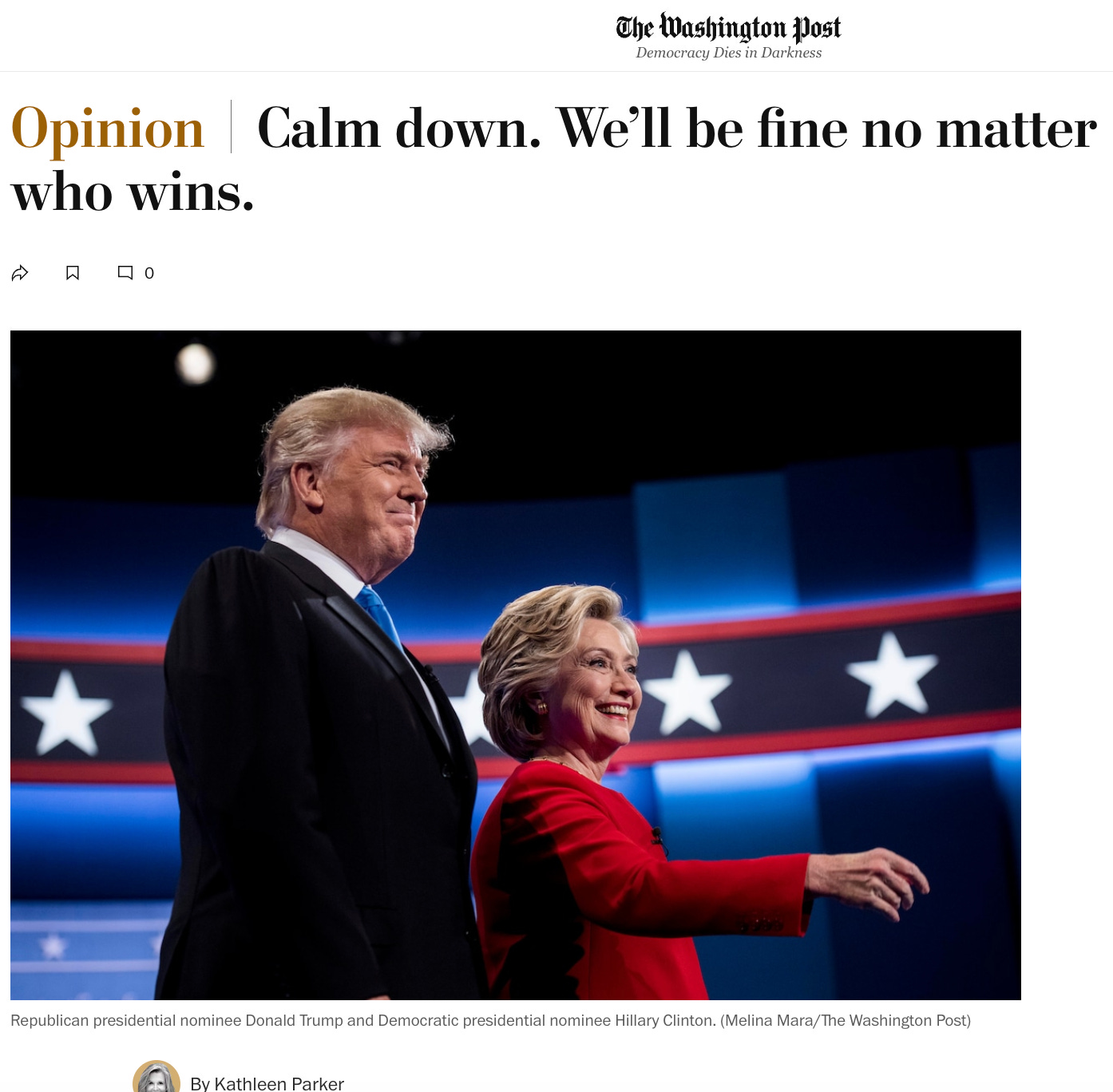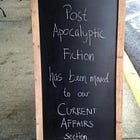What Happens Now
"We all distort what we see. We all have to struggle to see what's really going on.”
Welcome to the weekend edition of The Experiment, your official hopepunk newsletter. If you’d like to support my work, become a paid subscriber or check out the options below. But even if you don’t, this bugga free. Thanks for reading!
“You can always spot a fool, for he is a man who will tell you he knows who is going to win an election. But an election is a living thing—you might almost say, the most vigorously alive thing there is—with thousands upon thousands of brains and limbs and eyes and thoughts and desires, and it will wriggle and turn and run off in directions no one ever predicted, sometimes just for the joy of proving the wiseacres wrong.”
― Robert Harris, Imperium
I really blew it, and I’m sorry for that, but I am not here to wear a hair shirt or to conduct an autopsy. Neither can I mourn because I am not yet sure what has died. I am here today to admit both the obvious and the unknown. I did not see the thing that our plane crashed into, and I do not yet know what that thing was.
To this admission of ignorance I happily add the possibility, as Joan Didion put it in a 1975 commencement address, of “looking out, about looking out at the world and trying to see it straight.” Notice she said “trying to see it straight” and not the more elegant and direct “seeing it straight” that an editor would suggest. Like pursuing happiness, the business of being an adult in America offers us the opportunity to try and not the guarantee of success.
“I’ve had to struggle all my life against my own misapprehensions, my own false ideas, my own distorted perceptions. I’ve had to work very hard, make myself unhappy, give up ideas that made me comfortable, trying to apprehend social reality,” she told the graduates. “We all distort what we see. We all have to struggle to see what's really going on.”
Again, our task first is to struggle.
“We all distort what we see. We all have to struggle to see what's really going on.”
This is supposed to be hard, and given the difficulty I absented myself from the hot takes and premature analyses of incomplete data. Frank Spring makes this point better here: “Bluntly I would urge a low-to-zero tolerance attitude for Assertion of Priors in place of actual analysis; it’s unserious.” With the exception of Sally Jenkins, a first-ballot Hall of Fame thinker about America, I haven’t read a single newspaper column since Election Day, and brother, I may have extended my life span. Avoiding unnecessary opinions is a balm.
Cruising Substack’s Notes, however, I ran across Masha Gessen’s election-night reaction. If you’re unfamiliar with Gessen, they’re1 a Russian-born journalist and author of The Future is History: How Totalitarianism Reclaimed Russia. They are also a columnist for The New York Times, but don’t hold that against them. They can look at a thing, even a terrible thing like what Putin has done to their homeland and friends, and not flinch. This is what they see when they looks at us.
I think we need to rethink our framing of our political predicament. We have been talking about a highly polarized country, about two Americas, about a race that appeared to be a dead heat. But what strikes me about what we know so far is that Trump not only may get an Electoral College landslide; he seems to have picked up votes everywhere, including every borough of New York City. So we may need to stop thinking about a country that’s split down the middle and start trying to understand this country as being dominated by Trumpian politics or, perhaps more accurately, a Trumpian affect.
They say this knowing they are stuck with us. This year they were convicted in abstentia by a Moscow court for “spreading false information.” Their real crime was conducting a 2022 interview with an anti-war Russian blogger. Telling the truth about Putin’s invasion of Ukraine is illegal in Russia, and for that, “I will probably never be able to go home again,” said Gessen. If they say that we are living in Trumpian America, we need to take them seriously.
It’s hard to see and accept what is happening right in front of us not because of the terrible nature of events but because of where we are positioned in time and space. The hardest place to get a view of an entire mountain is when you’re on it.
“It remains an irrefragable law of history that contemporaries are denied a recognition of the early beginnings of the great movements which determine their times,” stated Austrian writer Stefan Zweig in his memoir The World of Yesterday. Zweig’s writings inspired 2014’s The Grand Budapest Hotel, a comedy encroached upon and finally overrun by fascism. What starts with pastries and whimsy ends with police tearing up Zero’s refugee papers and pulling M. Gustave off a train and shooting him in the snow. The characters thought they were living in a cosmopolitan, post-nationalist Hungary and didn’t take the new foot-stompy gendermers seriously until they were on the train.
“It remains an irrefragable law of history that contemporaries are denied a recognition of the early beginnings of the great movements which determine their times.”
Director Wes Anderson modeled the character of M. Gustave “significantly on Zweig,” he said, which is at first odd. M. Gustave is a hotelier and an unserious man; Zweig was one of Europe’s most-celebrated writers of the interwar period. But there are deeper parallels. “My experience of reading The World of Yesterday was full of the sense of surprising realities being disclosed,” said Anderson.
Those realities surprised Zweig. At first, Zweig laughed at the young men marching around with the Nazi armbands. Hitler’s coup attempt had failed. He’d been imprisoned for it, for crying out loud. In his mind’s eye, Zweig charted Europe’s post-nationalist progress up and to the right. No one, he judged, could possibly take these people seriously.
Zweig, who was Jewish, eventually saw, to paraphrase Didion, what was really going on. After the police raided his home, he and his wife left Austria for good.
“Against my will, I have witnessed the most terrible defeat of reason and the most savage triumph of brutality in the chronicles of time. Never—and I say so not with pride but with shame—has a generation fallen from such intellectual heights as ours to such moral depths,” he wrote.
“Against my will, I have witnessed the most terrible defeat of reason.”
Perhaps you share a practiced and time-tested inclination with me at this moment. In remembering certain stories, I think to myself, It can’t happen here. This comfort is often found in company with its hopeful cousin, This isn’t normal. We can go back to normal. Even those who have been in much worse situations, such as Zweig, have held onto these comforts.
“Even from the abyss of horror in which we try to feel our way today, half-blind, our hearts distraught and shattered, I look up again and again to the ancient constellations that shone on my childhood, comforting myself with the inherited confidence that, some day, this relapse will appear only an interval in the eternal rhythm of progress onward and upward,” he wrote.2
I love that phrase “inherited confidence.” We are not the first to clutch those comforts to our chests. In his essay Looking Back on the Spanish War, George Orwell said that there are only two safeguards against totalitarianism:
One is that however much you deny the truth, the truth goes on existing, as it were, behind your back, and you consequently can’t violate it in ways that impair military efficiency.
The other is the “liberal tradition” existing at least somewhere in the world. But inherent in the second safeguard is its downfall. If you live in a place that has enjoyed some sort of democracy for a while, you might argue yourself out approaching dangers.
We in England underrate the danger of this kind of thing, because our traditions and our past security have given us a sentimental belief that it all comes right in the end and the thing you most fear never really happens. Nourished for hundreds of years on a literature in which Right invariably triumphs in the last chapter, we believe half-instinctively that evil always defeats itself in the long run. Pacifism, for instance, is founded largely on this belief. Don’t resist evil, and it will somehow destroy itself. But why should it? What evidence is there that it does?
Gessen told us. We may need to stop thinking about a country that’s split down the middle and start trying to understand this country as being dominated by Trumpian politics. This election did not fail to offer us clear choices, and Donald Trump did not hide his true self. He promised to jail his enemies, who include Americans who oppose or criticize him. Everything else is window dressing: not understanding how tariffs work, the felonies, his abhorrent and criminal treatment of women, his deceit, his corruption, his obviously and worrisome decline, including how badly applied his orange greasepaint was. “They’re eating the dogs!” Yes, yes, I know. But the real money shot was retired Marine Gen. John Kelly, Trump’s longest-serving chief of staff, saying that Trump “certainly falls into the general definition of fascist.”
“Well, looking at the definition of fascism: It’s a far-right authoritarian, ultranationalist political ideology and movement characterized by a dictatorial leader, centralized autocracy, militarism, forcible suppression of opposition, belief in a natural social hierarchy,” he said.
Mr. Kelly said that definition accurately described Mr. Trump.
“So certainly, in my experience, those are the kinds of things that he thinks would work better in terms of running America,” Mr. Kelly said.
“Certainly the former president is in the far-right area, he’s certainly an authoritarian, admires people who are dictators — he has said that. So he certainly falls into the general definition of fascist, for sure.”
Millions of Americans knowingly voted for the fascist. I respect the results of the election, but I do not respect a lot of these voters. I am mind-searingly angry at them, and I’m staying angry at them until they die or I do. Whatever failings can be put at the feet of Kamala Harris or others who fought on her side should be examined when possible, and this must be done with cool heads and kind hearts, because What Went Wrong in this election is that at last count 74,303,161 Americans voted for a fascist.3
Those voters will wear their choice for the next four years and, given the probability that Trump will get a few more seats on the Supreme Court, a generation. They have no excuse but their own failings as citizens—they voted, in a democracy, for a fascist—and as adults—they did not see what was really going on. Trump was full-color Donald Trump, in public and at great length. And they voted for him.
That’s the bad news.
Unlike in 2016 and for a large part of his first administration, no one could advise taking him “seriously, not literally.” No one can say that he’ll be constrained by institutions or guardrails. No one will wait for him to pivot. We lived through every hour of his presidency, reacting to everything. It was one outrage after another, and it was literally exhausting.
The good news is that not all of us have been memory-holed. Last time, we reacted. This time, we know what’s coming. For crying out loud, they wrote their plans down and published them in a damn book! This time we don’t have to react to everything that happens because we pretty much know what that will be. This time, we get to respond.
Get ready for things to get bad, and make plans. Don’t cooperate or make yourself convenient for them. Don’t make yourself less objectionable. But most importantly, don’t wait for them to make the first move. We know what’s going to happen, so decide what you want to do and do it.4 We’re past protesting and yard signs about your household’s myriad virtues. Now is not the time to signal virtues but to put them into practice.
Because this is just the end of the movie. Now is when we walk outside, blink our eyes in the light, and begin the work of seeing the way things really are and then doing what is necessary to change them. What happens now is up to you.
“I don't know the future. I didn't come here to tell you how this is going to end. I came here to tell you how it's going to begin.” -Neo
Jason Stanford is a co-author of NYT-best selling Forget the Alamo: The Rise and Fall of an American Myth. His bylines have appeared in the Washington Post, Time, and Texas Monthly, among others. Follow him on Threads at @jasonstanford, or email him at jason31170@gmail.com.
Further Reading
Keep Hope Alive
Waco is as good as any place for hope to die, and yesterday was a better time than most. A choir comprised of men imprisoned for the Jan. 6 insurrection sang “Justice for All.” Behind them played images of the pro-Trump rioters on a massive screen. Then Ted Nugent called Ukraine President Volodymyr Zelenskyy a “homosexual weirdo,” followed by former Pre…
We win in the end
This is the always free, reader-supported weekend edition of The Experiment, your official hopepunk newsletter. If you’d like to support my work, become a paid subscriber or check out the options below. But even if you don’t, this bugga free. Thanks for reading!
Every dystopian story starts this way.
I heard the saddest thing last week. I was having lunch with a work friend who was burned out and looking for a career change, and she mentioned that she and her boyfriend had decided against having children because of climate change.
We set up a merch table in the back where you can get T-shirts, coffee mugs, and even tote bags now. Show the world that you’re part of The Experiment.
Buy the book Texas Lt. Gov. Dan Patrick banned from the Bullock Texas History Museum: Forget the Alamo: The Rise and Fall of the American Myth by Bryan Burrough, Chris Tomlinson, and myself is out from Penguin Random House. The New York Times bestseller is out in paperback now!
Gessen is non-binary.
Zweig’s story does not have a happy ending. In 1942, he and his wife died in an apparent suicide pact.
Oddly, and I’m using that word gently, on the Pivot podcast Scott Galloway said that in one exit poll most voters who said democracy was their top issue voted Trump. Given my distaste for and recent track record with analyzing polls, I haven’t bothered to track that down and offer it here in a footnote in the hope that misery’s stance on company remains unchanged.
Unless what you think we need to do is blame trans people, because if that’s what you think then you need to work on yourself.








Just a note: Gessen is nonbinary, I believe, and uses they/them last I knew.
“Mind-searingly angry” certainly sums it up.